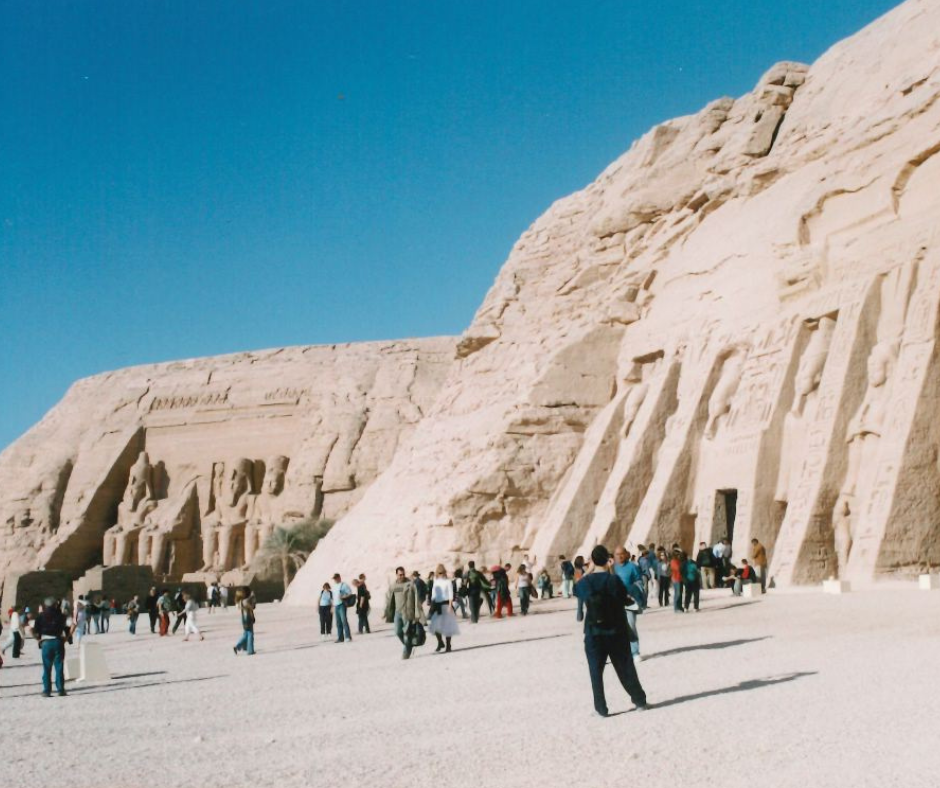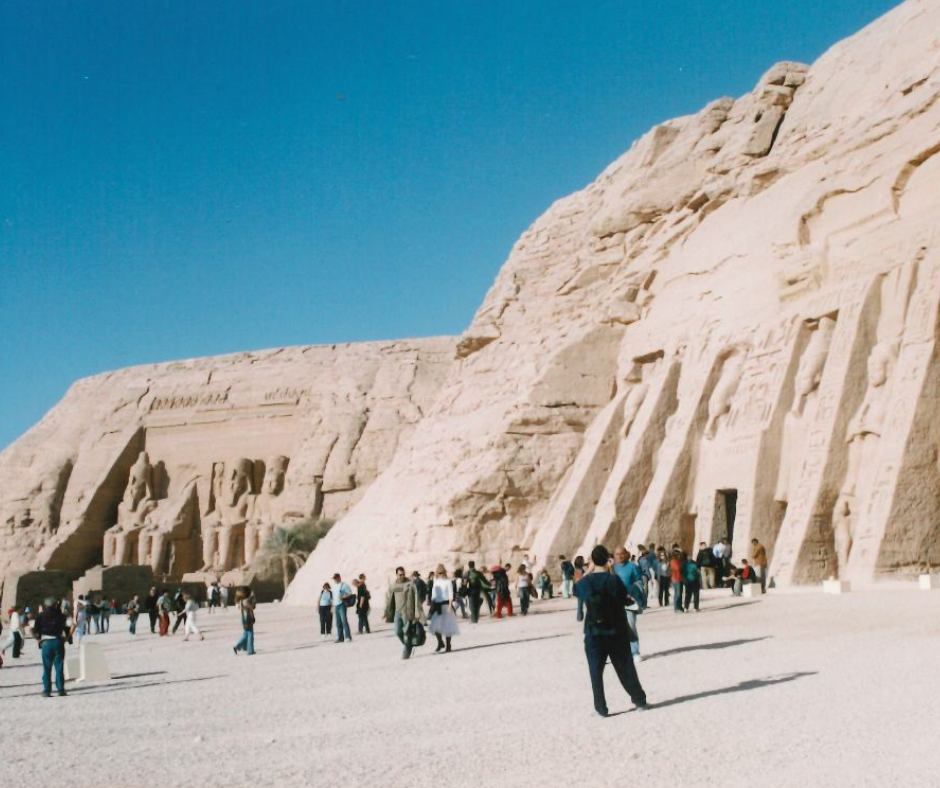
Back in 2005, I ticked off one of Egypt’s most fabulous treasures from my travel bucket list — the magnificent temples of Abu Simbel. Imagine first giant stone faces staring out over the desert, each one telling ancient stories carved into every corner. Then, as the sun rises, a magical glow spreads — the kind that could make even the grumpiest morning person smile. In this post, I’ll take you through my unforgettable Visit to this jaw-dropping site — sand, sunburn, and all!
The Day I Met Four Giant Pharaohs
We left our hotel at 5 AM and were escorted by security through the desert to visit one of my bucket list sites. There I was, standing in the middle of the Egyptian desert, squinting at what looked like four massive giants carved into a cliff. Turns out, it wasn’t a mirage from the heat — it was Abu Simbel, one of the most jaw-dropping archaeological sites in all of Egypt. And trust me, no photo or postcard can prepare you for how truly massive it is.
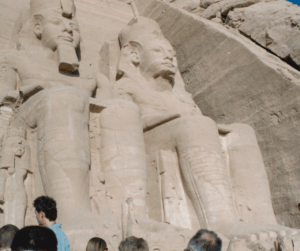
A Temple Fit for a King (Literally)
Built over 3,000 years ago by Pharaoh Ramses II — who clearly wasn’t shy about his face — Abu Simbel was meant to impress anyone crossing Egypt’s southern border. Think of it as Ramses’ way of saying, “Welcome to my kingdom. Please admire my face… four times.”
Each statue stands about 20 meters tall, and yes, all four are Ramses himself. (Talk about a confidence boost!) Inside, the walls tell tales of battles, gods, and victories — plus a little love story for his favorite queen, Nefertari. Meanwhile, her temple just next door is smaller, yet still filled with grace and beauty — because even mighty pharaohs knew better than to outshine their queens completely.
🏗️ The Great Temple Move
Every block was cut, numbered, and rebuilt piece by piece on higher ground — saved from being swallowed by Lake Nasser. Imagine dismantling a mountain-sized Lego set and rebuilding it perfectly. I can barely reassemble flat-pack furniture without leftover screws!
Standing there, you can feel ancient and modern genius blend — like two civilizations giving each other a high five across history.
🌅 My Visit – Sand, Sun, and Sheer Awe
The journey to Abu Simbel was an adventure on its own. I remember the early morning minivan ride from Aswan. Earlier that day, we left before sunrise, armed with water, snacks, and a camera.
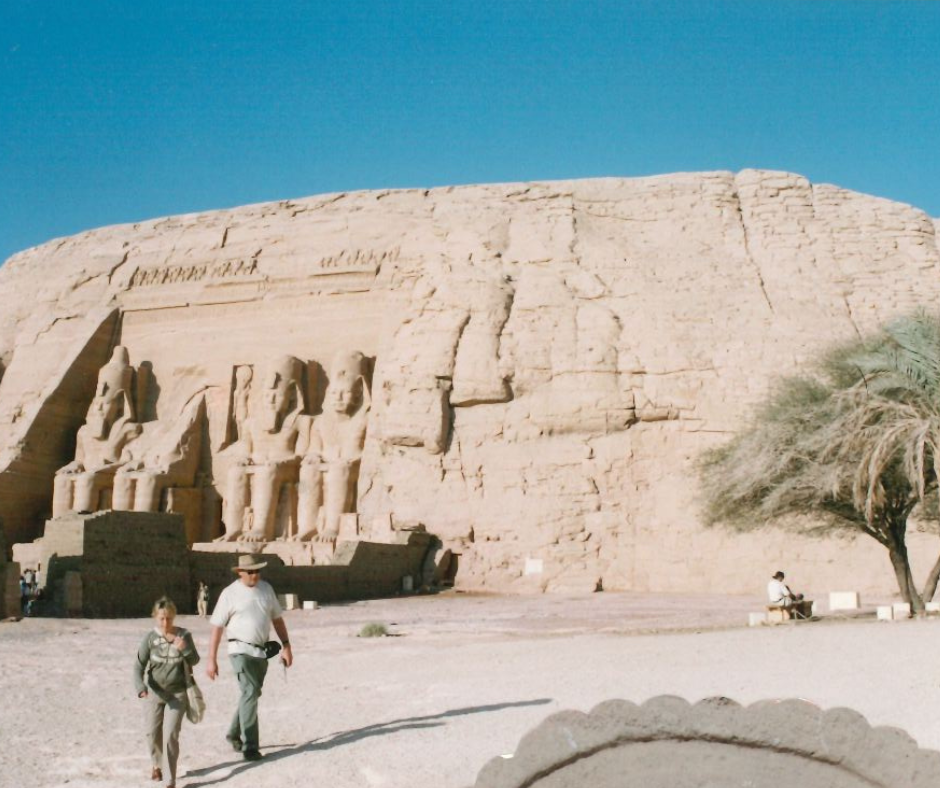
The desert stretched endlessly. As the sun rose, the sand turned gold. Later, when I finally arrived, those enormous statues glowed in the morning light, and suddenly, the long trip felt completely worth it. I just stood there — completely speechless. (A rare moment, trust me.)
Inside the temple, it was calm and quiet. The walls were filled with carvings of Ramses celebrating victories and divine connections. I couldn’t help but think — this guy really knew how to decorate a man cave that would last forever.
💡 Travel Tips for Today’s Visitors
If you’re planning a trip to Abu Simbel, here are a few must-know tips from one “Eating Tourist” to another:
- 🌞 Catch the sunrise — The early light makes the statues glow like they’re alive.
- 💧 Pack smart — Water, sunscreen, hat, and comfy shoes. The desert sun means business!
- 🏨 Stay in Aswan — The best base for visiting. You can go by bus, plane, or even on a Lake Nasser cruise.
- 💕 Don’t skip Nefertari’s Temple — Smaller, but breathtakingly beautiful.
First of all, try to visit during the light festival — twice a year, the sun lines up perfectly to illuminate Ramses’ statue inside. It’s a breathtaking moment you won’t want to miss.
Final Thoughts
Abu Simbel isn’t just a monument — it’s a conversation between the past and the present. Standing there, I felt tiny in the best way — just a traveler facing one of humanity’s most amazing creations.
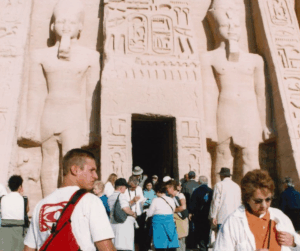
If you ever find yourself in Egypt, put Abu Simbel on your list. It’s hot, sandy. It’s completely unforgettable. Your jaw will drop, your camera will go wild, and you’ll leave with that warm, fuzzy feeling only ancient wonders can give.
Ramses II might have built it to show off his greatness. But I left thinking how incredible human creativity really is — whether it’s a pharaoh carving himself into a mountain or a traveler like me trying to capture it all in a single moment.
